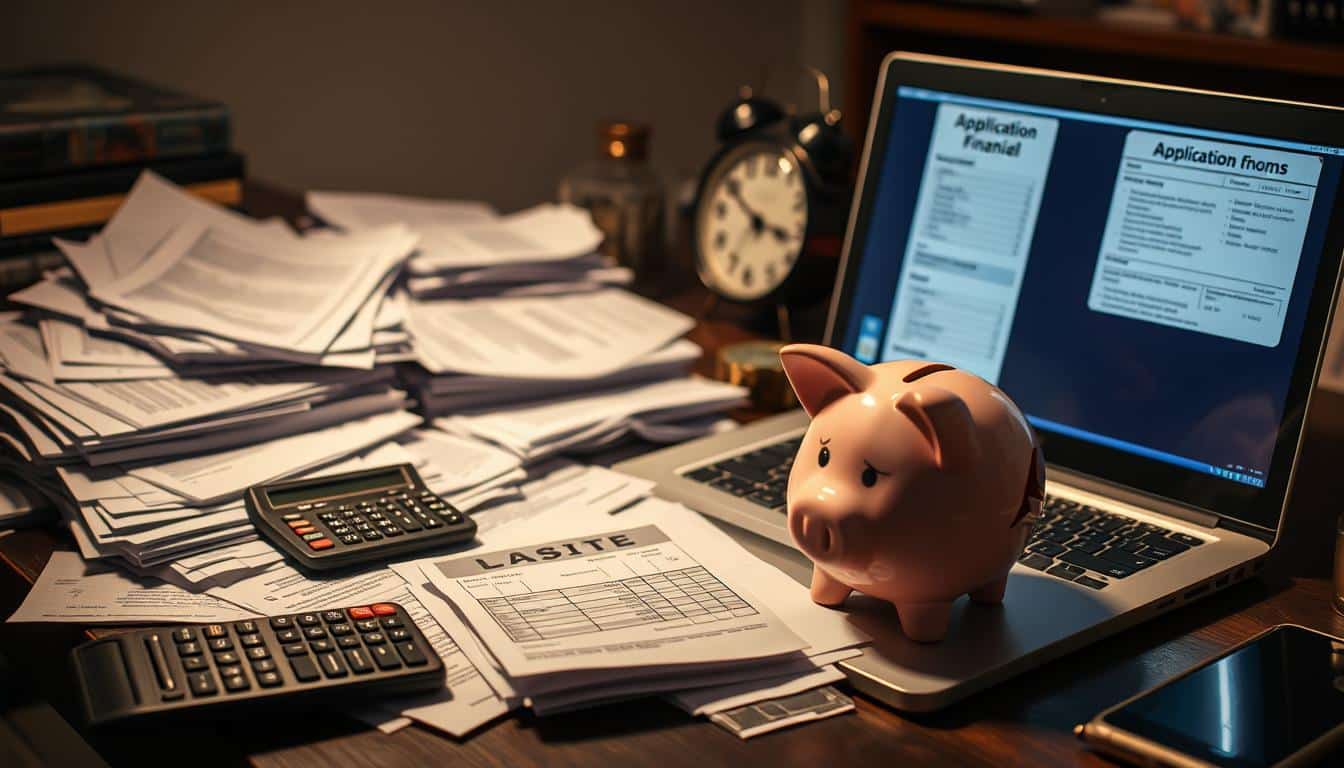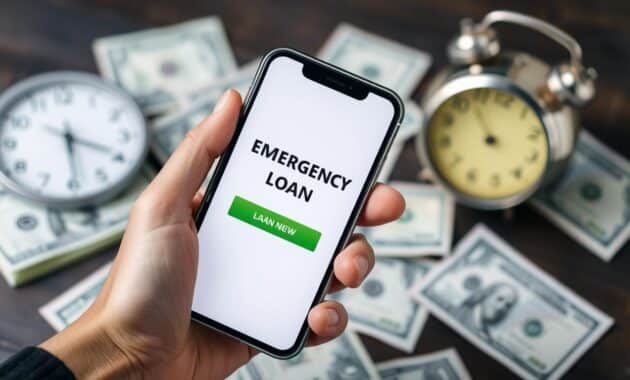Facing unexpected financial challenges can be stressful. Getting an emergency loan quickly can help. It can cover medical bills, car repairs, or other urgent costs. This article will guide you on how to get an emergency loan fast. We’ll cover the types of loans, options for bad credit or unemployment, and other emergency loan alternatives.
Key Takeaways
- Understand the different types of emergency loans available to find the best fit for your needs.
- Explore options for emergency loans even if you have bad credit or are unemployed.
- Learn the steps to quickly secure an emergency loan and get the funds you need.
- Discover alternatives to emergency loans, such as building an emergency fund, that can help you prepare for future financial emergencies.
- Avoid emergency loan scams by being aware of the warning signs and following best practices.
What Is an Emergency Loan?
An emergency loan is a fast way to get money for sudden costs like medical bills or car fixes. It’s made for people who need cash right away. These loans have easier rules to get than regular personal loans.
Types of Emergency Loans
There are a few kinds of emergency loans:
- Unsecured Personal Loans: These loans don’t need collateral and depend on your credit score.
- Payday Loans: These are short-term loans with high interest that you pay back on your next payday.
- Title Loans: These loans use your car as collateral for quick cash but risk your car if you can’t pay back.
- Credit Card Cash Advances: Taking cash from a credit card, which has fees and higher interest than buying things.
Emergency loans can be quick to get but have high interest and fees. Borrowers should think about the costs and terms before applying.
“An emergency loan can be a lifesaver when unexpected expenses arise, but it’s crucial to understand the terms and costs before committing to one.”
Emergency Loan for Bad Credit

Getting an emergency loan with bad credit is tough, meaning a credit score under 670. But, there are still ways to get a loan, even if they have higher interest rates and fees than regular personal loans.
For those with bad credit, a payday-alternative loan from a credit union is an option. These loans are short-term and have lower fees and easier repayment plans than payday loans. Credit card cash advances are also possible, but remember, they come with high-interest rates.
Payday loans and title loans are other choices, but they have very high interest rates and can lead to debt. It’s important to think about the good and bad of each option to avoid making your financial situation worse.
| Loan Type | Interest Rates | Fees | Repayment Terms |
|---|---|---|---|
| Payday-Alternative Loan | Lower than payday loans | Lower than payday loans | Typically 1-6 months |
| Credit Card Cash Advance | Higher than personal loans | Varies by card issuer | Typically due in full with next billing cycle |
| Payday Loan | Very high (often 400% APR or more) | High origination fees | Typically due in full on your next payday |
| Title Loan | Very high (often 300% APR or more) | High origination fees | Typically 30 days or less |
Getting an emergency loan with bad credit is harder, but it’s key to look at all your options. Pick the one that suits your financial situation and needs best. Knowing the risks and costs of each loan helps you make a smart choice and avoid getting into debt.
How to Get an Emergency Loan While Unemployed
Getting an emergency loan can be tough if you’re unemployed or have little income. But, with the right steps and knowledge of what lenders want, you can get the help you need in a crisis. Here are the main things to think about for an emergency loan when you’re unemployed.
Emergency Loan Requirements
Lenders look at your credit history, credit score, and other income sources when you apply for an emergency loan without a job. They might look at other income sources, like:
- Government benefits (e.g., Social Security, disability, or unemployment benefits)
- Income from alimony, child support, or retirement accounts
- Income from rental properties or investments
Having a cosigner or co-borrower with a good credit history and credit score can help you get an emergency loan. Lenders check your debt-to-income ratio to see if you can pay back the loan.
Knowing what emergency loan lenders want is key to finding the right loan for you. Get your documents ready and meet the lender’s needs to boost your chances of getting the emergency loan you need while unemployed.
Steps to Get an Emergency Loan

Getting an emergency loan is easy if you know what to do. You might need it for a sudden medical bill, car fix, or other urgent costs. Here are the main steps to follow.
- Research and Compare Lenders: Look at different emergency loan lenders to find the right one for you. Think about interest rates, loan amounts, and repayment terms to pick the best option.
- Complete the Loan Application: You’ll need to give personal and financial info, like your income, job status, and credit history. Be ready to send any documents needed for your application.
- Review the Loan Agreement: After approval, read the loan agreement carefully. It should cover the interest rate, repayment plan, and any fees.
- Receive the Loan Funds: If you agree to the loan terms, the lender will give you the money, usually in a few days. You can then use it for your urgent financial needs.
By following these steps, you can confidently apply for an emergency loan and get the funds you need for unexpected costs.
| Lender | Loan Amount | Interest Rate | Repayment Term |
|---|---|---|---|
| Lender A | $500 – $5,000 | 10% – 36% | 6 – 24 months |
| Lender B | $100 – $2,500 | 15% – 30% | 3 – 12 months |
| Lender C | $1,000 – $10,000 | 8% – 25% | 12 – 36 months |
This table shows a comparison of three emergency loan lenders. It highlights their main features and terms. By looking at these options, you can choose the one that fits your financial situation and budget.
Emergency Loan
When unexpected costs pop up, an emergency loan can be a big help. These loans offer fast cash, usually between $1,000 to $50,000 or more. You’ll pay them back over 1 to 7 years. The interest rates vary a lot, from about 8% to up to 36%.
You can get emergency loans from online lenders, traditional banks, and credit unions. Each place has its own rules and loan terms. It’s smart to look around and compare to find the best deal for you.
| Lender Type | Loan Amount | Loan Term | Interest Rate |
|---|---|---|---|
| Online Lender | $1,000 – $50,000+ | 1 – 7 years | 8% – 36% |
| Bank | $1,000 – $50,000+ | 1 – 7 years | 10% – 30% |
| Credit Union | $1,000 – $50,000+ | 1 – 7 years | 8% – 28% |
When looking at emergency loans, make sure to check the details. Look at the loan amount, loan term, and interest rate. This will help you pick the best option for your budget.
“An emergency loan can provide the financial support you need to cover unexpected expenses and get back on your feet quickly.”
Non-Loan Alternatives for Emergencies

Emergency loans can be helpful, but there are other ways to cover unexpected costs. Building an emergency fund with months of expenses can prevent the need for a loan. You can also ask creditors for a payment plan, look into financial assistance programs, or borrow from family and friends. These options are good if you have bad credit or low income.
Creating an emergency fund is a great way to prepare for emergencies. This fund should have enough money for three to six months of living costs. This way, you won’t need to borrow when unexpected bills or medical emergencies come up.
If you’re short on cash and don’t have an emergency fund, talk to your creditors. Many companies, like credit card providers and utility companies, can set up a payment plan to help you pay over time.
There are also government programs and non-profits that offer financial help. They can give grants, short-term loans, or other support to help you get through tough times without an emergency loan.
Lastly, you might be able to borrow from family or friends if you have people you trust. This can be cheaper than a traditional emergency loan. But, make sure to be careful and have a clear plan for paying them back.
| Non-Loan Alternative | Pros | Cons |
|---|---|---|
| Emergency Fund | Avoids debt, provides financial cushion | Takes time to build up, requires discipline |
| Payment Plan with Creditors | Flexible repayment options, may avoid late fees | Requires negotiation, may still incur interest |
| Financial Assistance Programs | Provide grants or short-term loans, often low-interest | Eligibility requirements, may have limited funding |
| Borrowing from Family/Friends | Potentially lower interest rates, more flexible terms | Can strain personal relationships if not repaid |
Avoiding Emergency Loan Scams
When you’re in a financial pinch, be careful with loan offers. Some lenders might try to trick you with high-interest loans and hidden fees. It’s key to check out any lender well before you apply for an emergency loan.
Tips for Avoiding Scams
Here are some ways to spot and dodge emergency loan scams:
- Look up the lender’s reputation online and on the Better Business Bureau site. Watch out for complaints or bad reviews that suggest they’re not trustworthy.
- Be cautious of lenders with very high interest rates or fees. These can be signs of predatory lending.
- Always read the details of any loan offer carefully. Make sure you understand all the terms and conditions. Pay special attention to how you’ll pay back the loan and any extra costs or penalties.
- Stay away from lenders who rush you into making a decision or seem more interested in your personal info than your loan repayment ability.
By doing your homework and being careful, you can protect yourself from emergency loan scams. This way, you can get the help you need without getting into trouble.
| Legitimate Lender | Potential Scam Lender |
|---|---|
| Transparent about interest rates and fees | Tries to hide or obfuscate interest rates and fees |
| Verifies your ability to repay the loan | Doesn’t care about your ability to repay the loan |
| Registered with the Better Business Bureau | Avoids or has poor Better Business Bureau rating |
| Offers reasonable repayment terms | Pushes for quick decisions and unrealistic repayment terms |
Also Read : The Benefits Of Using A Personal Car Loan To Finance Your Vehicle
Conclusion
Emergency loans can be a big help when you have sudden bills or financial problems. We looked at the different kinds of emergency loans, who can get them, and how to apply. This way, you can quickly get the money you need.
But, it’s important to look at all your options before making a choice. You might consider using your savings, getting a credit card advance, or looking into community programs. These can be good ways to handle your money troubles.
When deciding on an emergency loan, think about the good and bad sides. Make sure you know the interest rates and any risks. By being careful and informed, you can use a loan to pay for urgent costs without getting into trouble with high-interest rates or scams.
FAQs
Q: What are the best emergency loans available?
A: The best emergency loans typically include options like personal loans, credit union loans, and online lenders that offer competitive interest rates and quick approval times. It’s essential to compare emergency loans to find one that suits your financial needs.
Q: How can I compare emergency loans effectively?
A: To compare emergency loans, look at factors like interest rates, repayment terms, fees, and loan amounts. Additionally, consider the lender’s reputation and customer reviews to ensure you choose a reliable loan lender.
Q: What is the minimum credit score required for an emergency personal loan?
A: The minimum credit score required for an emergency personal loan can vary by lender. Generally, a score of 580 is considered fair, while a score above 700 is regarded as excellent credit, which may help secure better loan terms.
Q: Can I use an emergency loan for any expenses?
A: Yes, you can use an emergency loan to pay for unexpected expenses, such as medical bills, car repairs, or other urgent financial needs. However, it’s wise to consider alternatives to emergency loans if possible.
Q: What are some alternatives to emergency loans?
A: Alternatives to emergency loans include using an emergency fund, applying for a personal loan with favorable terms, borrowing from family or friends, or considering a secured loan if you have collateral.
Q: How do emergency loans impact your credit score?
A: Emergency loans may impact your credit score depending on the lender’s requirements for a credit check and how you manage the loan. Missing payments can negatively affect your credit, while timely payments can help build a positive credit history.
Q: What is the fastest way to apply for a personal loan for emergencies?
A: The fastest way to apply for a personal loan for emergencies is to use online lenders that offer quick applications and approvals, often providing loan proceeds as soon as the next business day.
Q: Are there any specific considerations for the best emergency loans of September 2024?
A: When looking for the best emergency loans of September 2024, consider interest rates, terms, and any special promotional offers. Also, ensure the loan aligns with your financial situation and goals.
Q: What should I do to build an emergency fund while managing loans?
A: To build an emergency fund while managing loans, set aside a small portion of your income regularly, reduce unnecessary expenses, and prioritize saving over paying off low-interest debt when possible.
Source Links
- https://www.bankrate.com/loans/personal-loans/how-to-get-an-emergency-loan-with-bad-credit/
- https://www.forbes.com/advisor/personal-loans/unemployment-emergency-loans/
- https://www.nerdwallet.com/best/loans/personal-loans/emergency-loans